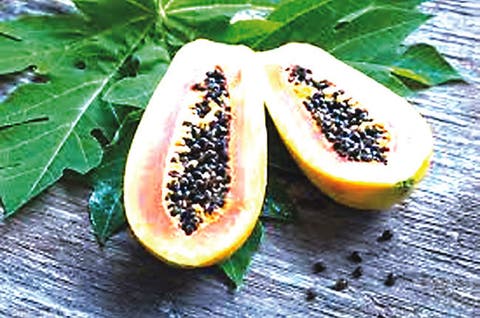PAWPAW SEED IS THE MOST EFFECTIVE WORM-EXPELLER – Experts
The name pawpaw is almost synonymous with a plant-based worm expeller. Now, experts’ comparative assessment of the de-worming effects of the leaves, stem, and seeds of the pawpaw tree, specify its seed as the most effective worm-expeller.
In a new study, the researchers said that all extracts of leaves, stem and seeds of the pawpaw tree were more effective than albendazole, a commonly prescribed worm expeller, in paralysis or killing a worm under laboratory conditions.
The pawpaw tree is well known for its nutritional and medicinal values. The various parts of the plant are used in different health conditions. The leaves are thought to increase breast milk and used in the treatment of tonsillitis
Different preparations from the leaves have found use in managing haemorrhoids, management of asthma, treatment of urinary tract infections, poultice for sores, and treatment of helminth infections. The fruits are used to treat indigestion, chronic diarrhoea, ringworm infections, bleeding piles, and amoebic dysentery.
Adult earthworms, Pheretima posthuma (Pheritimidae), were used for the study because of their anatomical and physiological resemblance with the human intestinal roundworm parasite, Ascaris lumbricoides.
Eight groups of test agents were administered to 22 groups of adult earthworms, with each group containing three earthworms of approximately equal size. The test agents were albendazole and normal saline, serving as the positive and negative control groups, respectively, and the six crude extracts were from the leaves, seeds and stem.
The test agents were administered to the adult earthworms in the respective groups. Observations were made for the time taken for paralysis and death of individual worms. Paralysis was said to have occurred when the test organisms had lost mobility.
The results of the anthelminthic activity testing in the journal, Evidence-Based Complementary and Alternative Medicine, indicated that all crude extracts prepared were more effective than albendazole in reducing paralysis time and death time. It was further shown that the extracts from the seeds were more effective than the extracts from the stem bark and leaves both in reducing paralysis and death times.
In addition, the effects of the extracts on paralysis and death times were concentration-dependent; increasing the concentration of the extract from 1 mg/ml to 5 mg/ml caused a significant decline in both the paralysis time and death time for the worms.
According to the researchers, “these observations, thus, confirm and authenticate the folkloric use of the plant parts in expelling parasitic worms.”
Preliminary phytochemical investigation showed the presence of alkaloids, saponins, and reducing sugars of glycosides present in all the crude extracts of pawpaw. Tannins were observed only in extracts of the leaves, while fixed oils were only present in the extracts of the seeds.
The researchers said that the outcome of the current study has provided a scientific justification for the preference of the seeds of pawpaw for the treatment of helminth infections; the outcome also asserted that the fixed oils present in the seeds could be responsible for such activity.
Worm infections are the most commonly encountered infections in man. When an individual is infected, the person excretes faeces infected with eggs of worms, thereby contaminating the soil. Worm infections usually result in cases of anaemia, pneumonia, eosinophilia, and malnutrition. Other reported symptoms include abdominal pains, nausea, and diarrhoea.
There are two clinically important forms of parasitic worms: the first consisting of those which reside in the host’s intestinal tract and the other those which reside in other tissues of the host’s body. Intestinal hookworms, roundworms, whipworms and tapeworms usually reside in the host’s intestinal tract, while trematodes, tissue roundworms and hydatid tapeworms reside in the host’s tissues.
Over the years, conventional drugs to expel parasitic worm infection, such as, albendazole, mebendazole, ivermectin, piperazine, and niclosamide, have been widely patronised to treat parasitic worm infections, in both livestock and humans.
However, due to factors such as cost, toxicity and reported cases of resistance development, their patronage and usefulness have been limited and substituted with cheaper alternatives, mainly herbal medicines.
A previous study had shown that the seeds were comparable to thiabendazole in terms of their activity against gastrointestinal parasitic worm in Red Sokoto goats. Another study had concluded that the seeds were safe and efficacious in eliminating intestinal worms.
@ Nigerian Tribune


